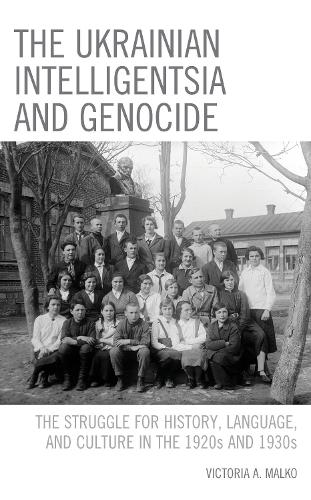
The Ukrainian Intelligentsia and Genocide: The Struggle for History, Language, and Culture in the 1920s and 1930s
(Hardback)
Publishing Details
The Ukrainian Intelligentsia and Genocide: The Struggle for History, Language, and Culture in the 1920s and 1930s
By (Author) Victoria A. Malko
Bloomsbury Publishing PLC
Lexington Books
19th October 2021
United States
Classifications
Professional and Scholarly
Non Fiction
European history
947.7084
Physical Properties
Hardback
398
Width 162mm, Height 227mm, Spine 30mm
835g
Description
This study focuses on the first group targeted in the genocide known as the Holodomor: Ukrainian intelligentsia, the brain of the nation, using the words of Raphael Lemkin, who coined the term genocide and enshrined it in international law. The studys author examines complex and devastating effects of the Holodomor on Ukrainian society during the 19201930s. Members of intelligentsia had individual and professional responsibilities. They resisted, but eventually they were forced to serve the Soviet regime. Ukrainian intelligentsia were virtually wiped out, most of its writers and a third of its teachers. The remaining cadres faced a choice without a choice if they wanted to survive. The author analyzes how and why this process occurred and what role intellectuals, especially teachers, played in shaping, contesting, and inculcating history. Crucially, the author challenges Western perceptions of the all-Union famine that was allegedly caused by ad hoc collectivization policies, highlighting the intentional nature of the famine as a tool of genocide, persecution, and prosecution of the nationally conscious Ukrainian intelligentsia, clergy, and grain growers. The author demonstrates the continuity between Stalinist and neo-Stalinist attempts to prevent the crystallization of the nation and subvert Ukraine from within by non-lethal and lethal means.
Reviews
Meticulously researched and documented, Victoria A. Malkos outstanding study is an indispensable read for those who hope to acquire nuanced understandings about the genocide in Soviet Ukraine known as the Holodomora tremendous cultural disruption that occurred in Ukraine from the late 1920s, culminating in the 1930s, when a significant part of the Ukrainian intelligentsia was exterminated by the Soviet regime. This text reveals that the Holodomor-genocide was designed to subdue the crystallization of a new cultural and ethnic identity in Ukraine, and explores the strategies of denial employed by perpetrators of the genocide and their long-lasting effects they have had on the future of the nascent nation.
-- Olga Bertelsen, Tiffin UniversityThis excellent work is one of the most sustained scholarly books I know that examines Moscow's assault on Ukraine in the early Soviet period. From the beginning to the end, it makes a clear and forceful argument for how consistently violent Moscow's political treatment of Ukraine was. It demolishes Moscow's claims about its policy of promoting Slavic brotherhood and internationalism. It presents a convincing argument on Moscow's use of political terror as a weapon to subjugate Ukraine to its will. This impressive book is indispensable for the study of Ukraine and the Soviet Union and for genocide studies in general.
-- Hiroaki Kuromiya, Indiana University BloomingtonIn what may be a foretaste of future trends in scholarship, Victoria A. Malko's excellent monograph unapologetically treats the famine of 19321933 that killed millions of Ukrainians as a genocide. Unlike much Holodomor literature, Malko shifts the focus of her analysis from the peasantry to the intelligentsiaand to teachers in particulara wise move that enables her to broaden the focus of Moscow's genocidal policies as well as to incorporate Stalin's cultural revolution into her narrative. All in all, Malko's is a worthy contribution to the burgeoning literature on the Holodomor.
-- Alexander J. Motyl, Rutgers University-NewarkVictoria A. Malko's important new study of the Holodomor, the horrific Ukrainian killer famine of 19321933, is wide-ranging and deeply researched. Focusing primarily on the tragic fate of the Ukrainian intelligentsia and especially on the role of teachers in the events, Malko skillfully guides the reader through the multiple dimensions of the genocide, from its origins in the Soviet Leninist-Stalinist system to its effects on independent Ukraine today.
-- Norman M. Naimark, Stanford UniversityAuthor Bio
Victoria A. Malko is in the Department of History and is founding coordinator of the Holodomor Studies Program at California State University, Fresno.
